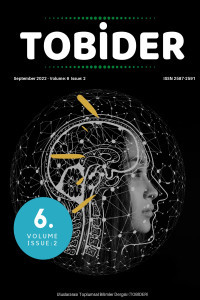EDEBİYAT TEMALI OTELLER: TOPSIS İNCELEMESİ
Günümüzde insanlar özel ilgilerine göre turistik faaliyetlere katılmaktadır. Kurgusal ya da gerçek uzamların bir bütün olarak değerlendirilmesiyle oluşan edebiyat turizmi, turizm ve edebiyat ilişkisi noktasında, bir farklılaştırma stratejisiyle edebiyat ve turizmin ortak noktası olan mekân, eser ya da yazarların yaşadığı yerler, edebiyat temalı otel ya da müze gibi destinasyonlara dönüştürülmesi turistlerin ilgisini çekmektedir. Özellikle, edebiyat severlerin turistik faaliyetleri sonucu oluşan edebiyat turizmi, edebi turist kavramını da beraberinde getirmiştir. Edebi turistler, seyahat esnasındaki okurlar olacağı gibi edebi eser ya da karakterden etkilenerek seyahat eden okurlar da olabilmektedir. Ayrıca, edebi bir rotayı izleyebilmekte, yazarların müzeye dönüştürülen evlerini ziyaret edebilmekte ya da edebiyat temalı otellerde konaklayabilmektedirler. Edebiyat temalı oteller, genellikle yazarın isimlerinin ya da eserlerinin otel odalarına konsept olarak kullanılan, içerisinde ilgili yazara ait görsellerin, kitaplarının ya da kütüphanelerin bulunduğu otellerdir.
Bu çalışmada, Trivago’da bulunan edebiyat temalı otellerin kriterlerine göre misafirlerinden almış oldukları puanlar çerçevesinde değerlendirilmesi, puanlarına göre sıralanması ve kriterlerin önem derecesinin belirlenmesi amaçlanmaktadır. Kriter puanları tam olan edebiyat temalı 10 otel TOPSIS yöntemiyle analiz edilmiştir. Analiz kapsamında otellerin genel puan, özellikler, konum, fiyat dengesi, temizlik, konfor, yemek, servis ve bina kriterleri değerlendirilmiştir. Analiz sonucunda, edebiyat temalı oteller arasında misafirlerin verdikleri puanlara göre bir değerlendirme sıralaması yapılmıştır.
Anahtar Kelimeler:
Edebiyat Temalı Otel, Edebi Turist, TOPSIS, Literary Themed Hotel, Literary Tourist, TOPSIS.
LITERATURE THEMED HOTELS: TOPSIS REVIEW
Today, people participate in touristic activities according to their special interests. Literary tourism, which is formed by evaluating fictional or real spaces as a whole, at the point of the relationship between tourism and literature, with a differentiation strategy, transforming the places, works or places where the authors live, into destinations such as literature-themed hotels or museums attract the attention of tourists. In particular, literary tourism, which is formed as a result of the touristic activities of literature lovers, has brought the concept of literary tourist with it. Literary tourists can be readers who travel by being influenced by a literary work or character, as well as readers during travel. They can also follow a literary route, visit authors' houses that have been turned into museums, or stay in hotels with a literary theme. Literary-themed hotels are hotels where the author's names or works are used as a concept for hotel rooms, and where the images, books or libraries of the relevant author are located.
In this study, it is aimed to evaluate the literary-themed hotels in Trivago according to the points they have received from their guests, to rank them according to their scores and to determine the degree of importance of the criteria. Ten literary-themed hotels with full criteria scores were analyzed using the TOPSIS method. Within the scope of the analysis, the general score, features, location, price balance, cleanliness, comfort, food, service and building criteria of the hotels were evaluated. As a result of the analysis, an evaluation ranking was made among the literature-themed hotels according to the scores given by the guests.
Keywords:
Literary Themed Hotel, Literary Tourist, TOPSIS,
___
- Baleiro, R. & Quinteiro, S. (2018). Key Concepts in Literature and Tourism Studies. Lisboa: Universidade de Lisboa.
- Çimen, H. (2013). Turizm ve Edebiyat Etkileşimi Üzerine. Karadeniz Uluslararası Bilimsel Dergi, 1(17), 79-85.
- Garcia-Cascales, M.S., Lamata, M.T. (2012). On Rank Reversal and TOPSIS Method. Mathematical and Computer Modelling, 56, 123-132.
- Güleryüz, S., Uluçay, A., & Yavuz, İ. M. (2021). Pandemi Koşullarında Otel Seçimiyle İlgili TOPSIS Tabanlı Bir Karar Verme Yaklaşımı. Avrupa Bilim ve Teknoloji Dergisi, (31), 951-956.
- Le Pavillon des Lettres Hotel, https://www.pavillondeslettres.com/ Erişim Tarihi: 12.10.2022.
- Özdemir, N. (2009). Turizm ve Edebiyat. Milli Folklor, 21(82), 32-49.
- Pera Palace Hotel, https://perapalace.com/hakkimizda/ Erişim Tarihi: 12.10.2022.
- Trivago, https://www.trivago.com.tr/ (Erişim Tarihi: 08.10.2022).
- Yıldırım, H. M. & Ergün, B., (2021). Edebiyat Turizmi: Kazdağları Üzerine Bir İnceleme. Seyahat ve Otel İşletmeciliği Dergisi, 18(2), 293-316.
- Başlangıç: 2017
- Yayıncı: Sadık Hacı
Sayıdaki Diğer Makaleler
UZAKTAN EĞİTİM SÜRECİNDE ÖĞRETMEN VE ÖĞRENCİ BAKIŞ AÇISI İLE ORTAÖĞRETİM TARİH DERSLERİ
MİMARİ CEPHELER VE HEYKEL SANATI ETKİLEŞİMİ; SEÇKİN PİRİM ÖRNEĞİ
ÇAĞDAŞ VE KLASİK YUNANCA OKUYAN ÖĞRENCİLERİN GEREKSİNİM, GÜDÜLENME VE TUTUM ANALİZİ
ERZİNCAN’DA SİYASAL YAŞAMIN TEMSİLCİLERİ: SİYASAL ELİTLER (1980-2022)
GÜNÜMÜZ TEKNOLOJİSİNDE MÜZİK KAYIT PROGRAMLARININ YERİ VE ÖNEMİ
ECHOES OF “CANTO III,” “CANTO IV,” AND “CANTO XXXII” IN “THE WASTE LAND”
RUS KİMLİĞİ BAĞLAMINDA A.S. PUŞKİN’İN YARATICILIĞINDA ÇAR I. PETRO’NUN ETKİSİ
EDEBİYAT TEMALI OTELLER: TOPSIS İNCELEMESİ
Aslı Uğur AYDIN, Ayşegül GÜDÜL, Ahmet ÖZKAN, Işıl AYDIN ÖZKAN
FRANSA’DA YAŞAYAN ÜÇÜNCÜ NESİL TÜRKLERİN UYUMU, KİMLİK ALGILARI VE DİL TERCİHLERİ
